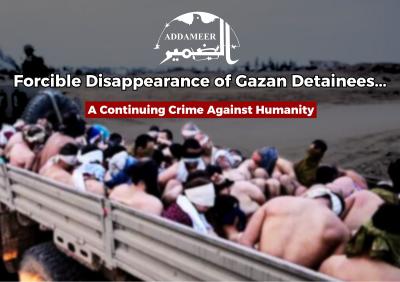
Since the commencement of the comprehensive aggression against Palestinians, the occupying authorities have conducted widespread arrest campaigns affecting various segments of the Palestinian population in different locations. The number of detainees from the West Bank and Jerusalem since the 7th of October until today has reached (4575) detainees, aside from hundreds of cases of arrests from Gaza.
Amid the complete isolation imposed on prisoners, specifically from Gaza, and with the International Committee of the Red Cross being denied visits, and lawyers barred from visiting detainees from Gaza, an article published in the Israeli newspaper “Haaretz” revealed the heinous crimes committed against male and female detainees in the "Sdeh Teiman" and "Anatot" army camps. The article highlighted that a number of detainees have been killed inside these camps without any confirmation yet regarding their numbers or identities. It also pointed out that the detainees endure extremely harsh conditions, being handcuffed and blindfolded most of the time. There are children and elderly Palestinians inside the "Sdeh Teiman" camp, while women are held in the "Anatot" camp in addition to the "Sdeh Teiman" camp. Prisoners in these camps sleep on very thin mattresses on the floor.
In the same context, there are over 30 Palestinian female detainees from Gaza in Damon Prison, suffering harsh conditions. Among the prisoners are children, elderly, sick, and wounded women. The eldest among them is an 82-year-old suffering from Alzheimer's disease. These detainees from Gaza are prohibited from communicating or interacting with other female prisoners in different cells within the prison. They have been barred from visits by lawyers until today. Moreover, they are provided with inadequate and poor-quality meals, and they are allowed only a short shower time, not exceeding 15 minutes, for more than 30 detainees. Additionally, their rooms are raided and searched daily.
Furthermore, two days ago, a large force of soldiers stormed the room of the detainees from Gaza, interrogated them, and transferred five of them to an undisclosed location.
The crimes of occupation aren't limited to forcibly concealing Gaza detainees in military camps. The law is also manipulated to hide detainees. Since the aggression began, the occupying authorities have amended military orders and laws to facilitate the prolonged detention of Palestinians without due legal process. They amended the Unlawful Combatant Law multiple times, allowing the issuance of an unlawful combatant order for up to 42 days instead of 7 days. The judicial review sessions now occur within 45 days instead of 14, and detainees can be prevented from meeting their lawyer for 80 days. Regarding emergency regulations preventing detainees under interrogation from meeting their lawyers, the prohibition period extends to 90 days. These amendments, prolonging the duration detainees are prohibited from meeting their lawyers and the periods they must appear before a judge, constitute another form of enforced disappearance. Lawyers are unaware of the detainee's whereabouts or the conditions they face. These amendments aim to prevent lawyers from monitoring and documenting the crimes and violations against Palestinian detainees.
In this context, the complicity of Israeli judges in the crime of enforced disappearance becomes evident. Judges' approval of extending the detention of detainees for prolonged periods while preventing them from meeting their lawyers is tantamount to judicial endorsement of torture, ill-treatment, and an attempt to conceal these crimes from lawyers and human rights organizations working in the field, especially in the absence of any international monitoring of the conditions of detention.
Enforced disappearance is considered a crime against humanity according to the Rome Statute of the International Criminal Court[1]. Given the International Criminal Court's reluctance to play its role in swiftly and effectively investigating occupation crimes and the clear bias shown by the prosecutor against Palestinians, we call on states to uphold their responsibilities, which include working towards a swift and effective investigation to hold the occupying state accountable for all its crimes over the past 75 years. This should be done in accordance with its obligations under international humanitarian law and international human rights law.